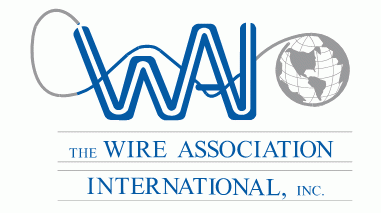WIRE JOURNAL INTERNATIONAL
Extrusion Veteran Offers A Range of Production Services
I was part of a generation raised by parents that had been influenced by the Great Depression and WWII, and they passed on to us a sense of responsibility, We knew we had to work for what we wanted, only we didn’t know what that was. We had to figure it out for ourselves. The times may be totally different today, but the challenges that existed back then and now in some ways are not so different.
In the late 1970s, like many others, I went directly from high school to college without any idea of what I wanted to do. I decided that I wanted to make money, so I left school. After a crazy experience working offshore on oil rigs, I moved back to Louisiana. I had two friends who worked at a place in Bossier City called Louisiana Wire and Cable, which six months later would get a new owner and name: Cadillac Wire & Cable (Cadillac). I applied for a job there and was hired. The following week I was introduced to the rod pit, a shovel and empty 55-gallon drums that I was told I would fill with copper mud. At $3.50 an hour, my career in the wire industry had begun.
Each day at Cadillac was a learning experience. We were running building wire in 250-ft coils of non-metallic (NM) sheathed cable at 1050-1100 fpm, with a cycle time of 13 to 15 seconds. The end of the NM jacketing line had a dual-coiler head, with a semi-automatic coiler with a dancer, knife and snaggers, so packaging was done in line.
I started in “repack,” and soon wanted to learn and do more. I have always had a sense of curiosity, especially for mechanical things. I wanted to learn how to run all the process equipment as you needed to if you wanted to be promoted to a better-paying post, which I did.
Most of us on the shop floor were young, in our 20s, and there were few managers. Supervisors were mostly self-taught process engineers, maintenance mechanics and mechanical engineers. We largely taught ourselves how to keep the machines running and pushing the speeds. Each day was a learning experience. Cadillac was a great place to learn production, people skills and problem-solving. You also learned that the cardinal rule was that the lines could not stop.
Over five years, I worked as an extrusion operator (insulating and jacketing), QC inspector, production scheduler and supervisor. Process, planning, quality and customer satisfaction were ingrained in me. I also started taking classes again, and many years later earned a B.S. degree from FSU, but I think of the hands-on operation and daily demands of the shop floor as my real education.
My personal life also changed. I got married in 1982 at the age of 23, and that same year became a dad. I went from spending money on fun things and cars to buying formula and diapers. I worked even more hours. At one point, I worked five months without taking a day off. I also did some moonlighting at night. I was still young, and now that I had a good work history I was able to make choices. I decided to stay in wire and cable, and make it my career. I liked “making things,” and knowing that on any given day problems could surface on the shop floor, and that if I was good at what I did, I could play a big role in “keeping that line running.” In 1984, I heard about an opening for a plant supervisor at a small Arkansas town. Based on my experience at Cadillac, I got the job at the Phelps Dodge plant that would eventually become part of Alcatel. Over the next 35 years, I worked at a number of companies, but two that stood out were from my earlier years: Cadillac, and later GENCA.
I will always remember GENCA Vice President of Sales Frank Kondas, who hired me as a technical sales engineer. A few months later I was running customer trials in the R&D lab. At GENCA, I learned multiple additional downstream processes and the quirks of working with thermoplastic materials. This was all new to me, and I thought I was in heaven. If it was round and made out of a thermoplastic material, I got to play with it. I worked with customers to find the best combination of components to industrialize a prototype. I gained more knowledge here than in my previous 13 years.
During the years that followed, I was on the road a lot, including abroad, where I worked on a slew of wire and cable production processes. I learned to see the differences at plants You could tell that some employees wanted to better understand a problem, while others were there because their shift was not done. I believe that what makes a good employee is the desire to not just be there, but to be engaged, and to want to communicate.
You can’t tell someone to be that person: if they have the desire to be the best they can be, their future – and value – can be unlimited.
I just started my own consulting business, and that was possible because of my early years in wire and cable. I had several mentors along the way, and that experience encouraged me to find new opportunities where I could further grow.
A lot has changed since 1979. New technology has made the production easier and the machinery better. Many products that had multiple processes can now be done in just one pass. So what’s missing?
I feel what is lacking today is critical thinking and people skills. There’s far more information available, and that’s good, but I don’t see the same widespread desire by employees in many plants to want to understand a process. When things go bad, which is inevitable. it’s time to work with your colleagues to figure out what’s wrong, and how to make it right. To get that line running again. That’s what we specialized in long ago.
Most always, it was something you could figure out. I’m not suggesting we go back to a bygone era, one where safety was seldom even an afterthought. But there’s value in having employees know how a complete process works, not just their rule in it. We were expected to produce and maintain the process. You had to think outside of the box at times, and the processes inherently allowed you to see the big picture, and the better you saw it, the more it seemed to make sense. I don’t know how that gets wrapped into Industry 4.0 or the Smart Factory, but I firmly believe that the human element still matters. A lot of employers want to attract and keep good employees, they need to instill a sense that they are vital, not just button pushers. If they have ideas, listen. If they want to learn more, support that desire. A plant floor has an identity and part of that should be a sense of good morale. Staff needs to work together, to teach each other techniques, to learn more and to experiment.
When a team effort leads to a break-through, everyone wins, and that matters in any era.

